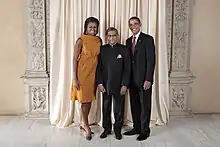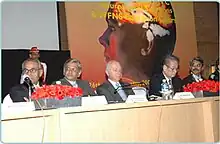S. M. Krishna
Somanahalli Mallaiah Krishna (born 1 May 1932) is an Indian politician who served as Minister of External Affairs of India from 2009 to October 2012.[1] He was the 10th Chief Minister of Karnataka from 1999 to 2004 and the 19th Governor of Maharashtra from 2004 to 2008. SM Krishna had served as the Speaker of the Karnataka Vidhan Sabha from December 1989 to January 1993. He was also a member of Lok Sabha and Rajya Sabha at various times from 1971 to 2014. In 2023, Krishna was awarded the Padma Vibhushan, the second highest civilian award of India.[2]
S. M. Krishna | |
|---|---|
_(cropped).jpg.webp) Krishna as external affairs minister at the U.S. Department of State in Washington, D.C., June 3, 2011
. | |
| 27th Minister of External Affairs | |
| In office 23 May 2009 – 28 October 2012 | |
| Prime Minister | Manmohan Singh |
| Preceded by | Pranab Mukherjee |
| Succeeded by | Salman Khurshid |
| 18th Governor of Maharashtra | |
| In office 12 December 2004 – 5 March 2008 | |
| Chief Minister | Vilasrao Deshmukh |
| Preceded by | Mohammed Fazal |
| Succeeded by | S. C. Jamir |
| 10th Chief Minister of Karnataka | |
| In office 11 October 1999 – 28 May 2004 | |
| Preceded by | J. H. Patel |
| Succeeded by | N. Dharam Singh |
| 1st Deputy Chief Minister of Karnataka | |
| In office 21 January 1993 – 11 December 1994 | |
| Chief Minister | M. Veerappa Moily |
| Preceded by | Office Established |
| Succeeded by | J. H. Patel |
| Constituency | Maddur |
| Personal details | |
| Born | 1 May 1932 Somanahalli, Kingdom of Mysore, British India (now in Karnataka, India) |
| Political party | Retired |
| Other political affiliations | Bharatiya Janata Party (March 2017 — 2023)
|
| Spouse | Prema |
| Relatives | V. G. Siddhartha (son in-law) |
| Alma mater | Mysore University Southern Methodist University George Washington University Law School |
| Honours | Padma Vibhushan (2023) |
Early life and education
S. M. Krishna is son of S.C. Mallaiah. He was born to a Vokkaliga family in a village named Somanahalli in the Maddur Taluk of Mandya district, Karnataka. He finished his High School in Sri Ramakrishna Vidyashala, Mysore. He completed his Bachelor of Arts from Maharaja's College, Mysore and obtained a law degree from University Law College, which was then known as Government Law College in Bangalore. Krishna studied in the United States, graduating from the Southern Methodist University in Dallas, Texas and The George Washington University Law School in Washington D.C, where he was a Fulbright Scholar. Soon after his return to India, he was elected to the Karnataka Legislative Assembly in 1962.[3]
Personal life
He is married to Prema. They have two daughters.[4] His daughter Malavika Krishna was married to the Late V. G. Siddhartha, a businessman and the founder of Cafe Coffee Day.[5][6]
At the dawn of his political life, he released his biography "Smritivahini" in the presence of many dignitaries. He has penned many interesting incidents including Veerappan Kidnapping of Rajkumar during his tenure as the chief minister.[7] He has also quoted that the former prime minister of India and national president of Janata Dal (Secular) H. D. Devegowda had strong plans of joining Indian National Congress twice during the period of National emergency.[8][9]
Political career

Krishna started his electoral political career in the year 1962 by winning Maddur Vidhana Sabha seat as an independent, defeating the prominent politician from Indian National Congress K V Shankar Gowda for whom Jawaharlal Nehru had campaigned. . Then he joined Praja Socialist Party, but lost from Maddur in 1967 to Congress' M M Gowda. He won the by-poll for Mandya (Lok Sabha constituency) in 1968 when the sitting MP died, defeating the Congress nominee.
In 1968 he was influential in reconciliation between members of the Indian National Congress and Praja Socialist Party. He served three terms as an MP from the Mandya constituency of Karnataka starting from 1968 by-poll as a socialist. His next two terms were as a Congressman, winning elections in 1971 and 1980. Mandya has remained a Congress stronghold, represented in Lok Sabha later by his political proteges like Ambareesh and Divya Spandana (also known as Ramya). S M Krishna resigned from Lok Sabha in 1972, and became MLC in Karnataka and was appointed a minister by Devaraj Urs.
After he went back to Lok Sabha in 1980, and he served as minister under Indira Gandhi between 1983–84. He lost from Mandya Lok Sabha seat in 1984, and it is unclear if he served as a minister between 1984 and 1985 under Rajiv Gandhi. Later, he became a member of the Rajya Sabha in the years 1996 and 2006. He was member of the Karnataka Legislative Assembly and council at different times. Between 1989 and 1993 he was Speaker of the Karnataka Legislative Assembly and Deputy Chief Minister of Karnataka from 1993 to 1994.
In 1999, as Karnataka Pradesh Congress Committee president, he led his party to victory in the assembly polls and took over as Chief Minister of Karnataka, a post he held until 2004. He was also instrumental in creating power reforms with ESCOMS and digitization of land records (BHOOMI) and many other citizen friendly initiatives. He encouraged private public participation and was a fore bearer of the Bangalore Advance Task Force. He later became the Governor of Maharashtra.
Krishna resigned as Governor of Maharashtra on 5 March 2008. It was reported that this was due to his intention to return to active politics in Karnataka.[10] President Pratibha Patil accepted his resignation on 6 March.[11] Krishna entered the Rajya Sabha and subsequently took the oath of office as Union Cabinet Minister of External Affairs in the Council of Ministers under Prime Minister Manmohan Singh on 22 May 2009. In his tenure as the external affairs minister, he visited a number of countries including Tajikistan in 2012 to strengthen economic and energy ties.[12]
Krishna resigned as External Affairs Minister on 26 October 2012 indicating a return to Karnataka state politics.[1][13]
Krishna resigned as a member of INC on 29 January 2017 quoting that the party was in a "state of confusion" on whether it needed mass leaders or not. He also complained of having been sidelined by the party and that the party was "dependent on managers and not time-tested people like [himself]".[14] After speculations on his joining the Bharatiya Janata Party, he formally joined the party in March 2017.[15]
He announced his retirement from politics on 07-01-2023.
Positions held

- Member of 3rd Karnataka Legislative Assembly, 1962–67, from Maddur. But lost in 1967 on PSP ticket.
- Member, Indian Parliamentary Delegation to Commonwealth
- Parliamentary Conference, New Zealand, 1965
- Member, 4th Lok Sabha 1968–1971, Socialist MP from Mandya after a by-poll when sitting MP died in 1967.
- Member, 5th Lok Sabha 1971–1972, Congress candidate from Mandya
- Member, Karnataka Legislative Council 1972–1977
- Minister for Commerce & Industries & Parliamentary Affairs, Government of Karnataka 1972–77
- Member, 7th Lok Sabha 1980–1984, from Mandya. But lost 1984 Lok Sabha election.
- Member, Indian Delegation to the United Nations, 1982
- Union Minister of State for Industry during 1983–1984
- Union Minister of State for Finance during 1984–1985
- Member, 9th Karnataka Legislative Assembly 1989–1994
- Speaker, Karnataka Legislative Assembly 1989–93
- Delegate to Commonwealth Parliamentary Seminar at Westminster, UK in March 1990
- Deputy Chief Minister of Karnataka, 1993–1994
- Elected to Rajya Sabha in April 1996
- Chief Minister of Karnataka October 1999 – 2004 (MLA from Maddur)[16]
- Re-elected to Karnataka Legislative Assembly: 2004 (Chamrajpet constituency)
- Governor, Maharashtra: 2004–2008
- Member, Rajya Sabha from Karnataka 2008–2014[17]
- External Affairs Minister, Government of India: 22 May 2009 to 26 October 2012.[18]
References
- "S M Krishna resigns ahead of Cabinet reshuffle; Soni, Wasnik too 'offer' to quit". The Times of India. New Delhi. PTI. 26 October 2012. Archived from the original on 3 April 2013. Retrieved 17 January 2013.
- "Padma awards: Sudha Murty, S M Krishna, Mulayam Singh Yadav, Zakir Hussain, others honoured". Deccan Herald. 22 March 2023. Retrieved 23 March 2023.
- "S.M. Krishna: US-educated, experienced politician". thaindian.com. 22 May 2009. Archived from the original on 7 April 2012. Retrieved 8 August 2016.
- "How SM Krishna finally made it". Deccan Herald. 23 May 2009. Retrieved 8 August 2016.
- MEGALKERI, BASU (19 April 2013). "NO, THANK YOU, MR SM KRISHNA". talkmag.in. Retrieved 8 August 2016.
- "Divya Spandana lashes out!". The Times of India. 4 May 2013. Retrieved 8 August 2016.
- "Rajkumar kidnap: The 'perfect script' that will remain a secret". The Hindu. 26 September 2018. Retrieved 5 January 2020.
- "Bengaluru: JD(S) objects to reference to Deve Gowda in Krishna's book". Daiji World. 26 December 2019. Retrieved 5 January 2020.
- "HD Deve Gowda wished to join Congress twice, reveals SM Krishna's book". New Indian Express. 29 December 2019. Retrieved 5 January 2020.
- "S. M. Krishna quits as Governor", The Hindu, 6 March 2008.
- "Krishna resignation accepted, Jamir in charge of State", Sify.com, 6 March 2008.
- "Krishna to pay a two-day visit to Tajikistan from tomorrow". The Times of India. 1 July 2012. Archived from the original on 26 January 2013.
- "Krishna quits, rejig to focus on youth". Hindustan Times. New Delhi. 26 October 2012. Archived from the original on 13 December 2012. Retrieved 17 January 2013.
- "Veteran leader S.M. Krishna quits Congress". Livemint. 30 January 2017. Retrieved 22 March 2017.
- Hebbar, Nistula (22 March 2017). "S.M. Krishna joins BJP". The Hindu. ISSN 0971-751X. Retrieved 14 March 2020.
- "Maddur Assembly Constituency Election Result – Legislative Assembly Constituency".
- "member profile".
- "Detail profile – Archive Site of National Portal of India". Govt. of India. Archived from the original on 27 September 2018. Retrieved 10 October 2013.